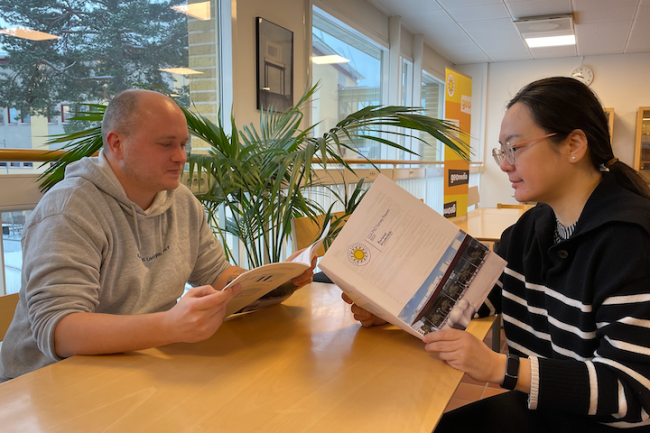Stress affects the health of PhD students
2023-12-12Nearly 1 in 5 PhD students at Karlstad University experience enough stress to adversely affect their mental well-being. This is revealed in a survey by the Graduate Student Association (GSA).
– The HR office is currently working on an action plan, says Patrik Larsson, pro-vice-chancellor and chair of the Health and Safety Committee.
The survey was conducted in May and June and presented in a report in November. Many PhD students feel burdened by high expectations and report working more than stipulated in their terms of employment. However, many also report feeling that they are not achieving enough. 18% said that this affects their mental well-being. They feel tired, anxious, restless, sad, and even hopeless.
– We have identified six problem areas where we propose action. Stress is one of those areas, says Joanne Kuai, chair of the Graduate Student Association.
– The other problem areas are basically contributing factors to the stress, adds Phil Aupke, deputy chair of the GSA.
Time-consuming
The six problem areas include the system for individual study plans (ISPs), which is widely considered time-consuming and complicated.
– Everyone understands the point of an ISP, but the system is not user-friendly and different departments all have different procedures.
The GSA proposes that the ISP administration be streamlined and updated to ensure a uniform approach throughout the university.
Hard to plan
In terms of courses, nearly 40% of PhD students reported quality issues and insufficient availability of courses that are required for their degree.
– Some courses are only offered every two years, which makes the mandatory components really hard to plan, says Phil Aupke.
Here, the GSA proposes action related to the quality and range of courses offered.
The GSA also suggests improvements to supervision, with one example being the collaboration between supervisors. This after nearly a third of PhD students reported that having more than one supervisor leads to an unclear division of responsibilities.
Too much teaching
Almost 60% of the PhD students that took the survey reported spending significantly more time on teaching than their terms of employment mandate.
– Yes, many of them think teaching takes up far too much of their time. Many also feel that we receive far too little pedagogical guidance ahead of teaching, says Joanne Kuai.
Compared to the previous major PhD student survey from 2020, the problem with teaching consuming too much time has increased by close to 30%.
The proposed action from the GSA includes more time earmarked for preparation, more practical training for PhD students ahead of teaching, and credits awarded for UPE teaching courses.
Report available on kau.se
The results of the survey have been compiled in a report available on the GSA page of kau.se:
All PhD students have received a copy and the report has also been distributed to department, faculty and senior management.
– We also have a meeting scheduled with the vice-chancellor, says Joanne Kuai.
Health and Safety Committee
In addition, the report was discussed at the most recent Health and Safety Committee meeting.
– We received a strong presentation at the meeting, and it’s a good study and report with clear proposals for improvements. It is especially serious that so many PhD students experience this level of stress. The HR office is currently working on an action plan intended to improve working conditions for our PhD students. We will synchronise those efforts with the action proposed in the GSA report, says Patrik Larsson, pro-vice-chancellor and chair of the Health and Safety Committee.
– Some issues brought to light in the report are systemic in nature and require more work before a solution can be implemented. While other issues can be resolved more quickly. One example is the course range. The university board has requested an update at their February meeting. We will then present a variety of measures as well as the plan going forward.
Facts
Survey Period: 17 May to 20 June 2023
Report launched: 10 November 2023
Survey link distributed to 214 active doctoral students
Response rate: 24 percent


